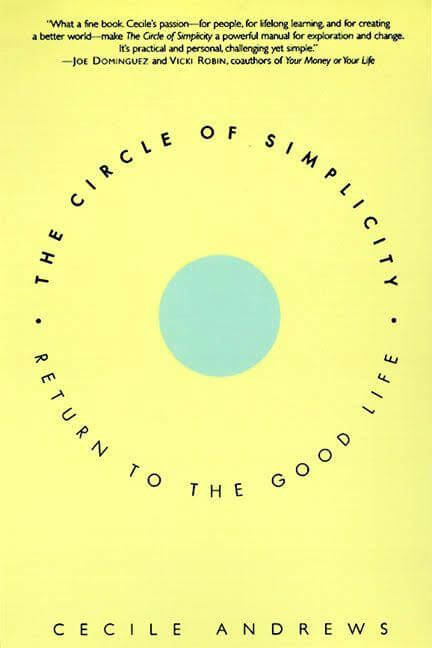
It only takes a look at most people’s closets, desks, shelves or homes to understand that life can be messy and complicated; most of us could stand to simplify a bit. My uncle was part of a simplicity circle in San Francisco when I was in college, and it always sounded interesting to me; he got a lot out of it and lives a simple, but satisfying and rewarding, life. So for National Simplicity Day, he suggested I speak with simplicity expert and author Cecile Andrews about how she defines “simplicity,” and what steps we can all take to live a simpler life.
Mayim Bialik: What is your “simple” definition of “simplicity?”
Cecile Andrews: For me, simplicity is the examined life. It’s asking what’s important, what matters and in particular, what matters in the terms of the well-being for people and the planet. Simplicity is getting rid of the inessential so that you have time for the essential. So a lot of different people may have a different notion of a simple life, but most of us would have in common things like lower consumerism and taking more time for appreciating things, but essentially, simplicity is looking at everything through a different lens and asking yourself, “Does this contribute to well-being?” And well-being can be defined in lots of ways: personal happiness is one way and then well-being in terms of the planet is another way. There’s also the well-being of ‘bigger’ issues such as fairness and equality.
MB: I’m sure there were a lot of things in your life that led to your interest in simplicity and your immersion in this world; but what’s your personal journey that led you here?
CA: I worked with the American Friends Service Committee after college. And that’s a Quaker organization so they implanted that notion of simplicity, but the thing that really got me was the Highlander Center. It’s where Rosa Parks was trained and they were central during the Civil Rights Movement in the 60’s. They brought poor people together to talk and they found answers to big problems. And so the idea is that bringing people together in small groups is really at the essence of changing the world.
I had always planned to be a teacher (I had been an English major and loved Henry David Thoreau which was a start on loving simplicity!) and I thought it would just be the traditional type of teaching: stand up in front of the classroom and lecture. But I started to learn how to bring about people’s wisdom so that they can take action together. I became a community college administrator and my whole thing was how to get people in the community to be excited about learning and social engagement. And so I started study circles.
At the same time there was a growing simplicity movement in Seattle and so I started simplicity study circles and they took off! We got press: the New York Times, the Washington Post, the Los Angeles Times, Esquire and even the Wall Street Journal came to Seattle, looked at what we were doing and I got a call from Harper Collins asking if I’d want to write a book; so I did!
That gave people a way to work on inspiring people to participate in simplicity in ways other than just doing it on their own. Because for me, the core of simplicity is people coming together and working together. From those circles, people would lose their desire to consume and to compete and to get ahead because in our groups, they feel like they belong.
MB: How can simplicity transform relationships and communities and the environment? Can you talk about how can one concept do all of that?
CA: Well because it’s so basic. As I say it’s a lens because it’s trying to fight the American mentality of competing and trying to be number one. We’ve been told that if you’re rich you’ll be happy; if you just consume more, you’ll be happy. Now we have long-term scientific research that shows that none of those things really makes you happy. What makes you happy is connection with other people, having a sense of calling and a sense of control over your life. There’s always been a simplicity movement throughout history of people reacting to people consuming and over consuming and seeing that all of this doesn’t make people happier, it just makes them less satisfied.
MB: A lot of people hear the word “simplicity” and they might think that that sounds boring or underwhelming or that a simple life is a non-exciting way to live. I recently experienced a very significant shift in my life after reading The Life-Changing Magic of Tidying Up by Marie Kondo. I purged my house and I got rid of a ton of stuff I did not need and I’ve experienced a tremendous opening of mental energy and positivity because of simplifying my life I feel not only that I pared down but I know where everything is and I’m surrounded by simple pleasures and things that bring me joy. What are some of your own examples of the way simplicity can be either mind-opening, or dynamic or fun?
CA: Over the years what I’ve heard most people say to me about what I do is, “Why are you part of a self-deprivation movement?” And I respond that we’re trying to make life more fun! I actually never try to convince anybody about simplicity… I just tell my own story and just like you have said, you did this and it brought you this sense of pleasure and fun and enjoyment, and as we tell those stories, that’s what reaches out to people.
One of my books is called Less is More: Embracing Simplicity for a Healthy Planet, a Caring Economy and Lasting Happiness, but the big thing is that I really focus on building community because I think the reason we consume so much and compete so hard is because people essentially feel alone and unconnected in this culture and that if they can come together, it can be transformative.
So it’s gone beyond simplicity, which in the early days was more about “How do I change myself?” Now it’s “How do I change myself and how do I contribute to the common good?” Because for example, if we keep consuming as we are, it will continue to affect climate change even more, but when you continue to talk about climate change, people start tuning you out because again, it sounds like self-deprivation.
But if you talk about how wonderful it is, that can inspire people. To have simple pleasures and to have more time is critical. It’s not just anti-consumerism; it’s also anti-rushing-around. What grew out of the simplicity movement is the Take Back Your Time movement which was meant to be more about civic engagement: so that we work for things as a community like guaranteed sick leave, guaranteed parental leave, and guaranteed vacation, which all the other Western developed countries have but we don’t in this country. Without those policies, it’s very difficult to lead a simple life, because you’re rushing around all of the time and you’re frantic.
And of course the other part of a larger movement has to do with the wealth inequality in this country. No one can live simply if everybody is worried about competing, about getting ahead and working so many hours; and if people are unhappy or not treated well, they don’t dare quit their jobs or cut back.
And for me, going through school and graduate school I always felt like I have to get more done— I have to write a book, I have to do this etc. And sitting and just looking out the window would have seemed like a huge waste of time when I was in that mode of getting ahead. But now I realize that we have to take time to hang out and absorb things.
MB: I’m a lactation education counselor and obviously I help a lot of women with newborns but more and more the women that I speak to are under the gun to go back to work at one month or at six weeks. And although that may work for some women, the ideal way for me to help women breastfeed is not if they’re under the gun to have to go back to work! Our obsession with achieving more and getting ahead no matter the cost shifts your concept of being a parent when you feel it’s your job to be a professional! And it’s so hard for me because I don’t want to sound like a militant lactation counselor but your job is to also be a human being!
CA: Exactly. Michael Moore’s new movie Where to Invade Next talks about how European countries emphasize having a child and having a family. It’s something huge and important and special and its right up there with their work lives. And a year of maternity and paternity leave is standard in so many countries! And so what you bring up is an incredibly essential; because more and more people think, “Breastfeeding – how important is that?” Well, it’s almost symbolic of all these other things —we don’t have time for the important things.
MB: Absolutely. Speaking of babies and kids, I have an almost 11-year-old and an almost 8-year-old and their dad and I followed the Waldorf philosophy of parenting and education in their early years. People thought we were crazy when we said we didn’t believe that children needed toys for the first year of their life. And people thought we were crazy when we said we don’t want toys with batteries. I have seen a tremendous amount of an increase in consumerism and things for children and babies even since my first son was born and I wonder if you can speak to that.
CA: If you watch anything at all on television, the ads are there every five seconds it seems…This is why I always find it so important to belong to a circle, to belong to a group, because when you’re surrounded by people who don’t agree with you, even though you know you’re not crazy, when people tell you you’re crazy over and over and society says it too, it starts to feel a little lonely. Research shows that we tend to be like the people we’re around…so you need to find a group that supports you and believes in what you’re doing because it’s very hard to resist consumer society and we sooner or later discover that we have been affected by it even if we tried to resist it!
MB: What do you think makes people truly happy then? Is it simplicity?!
CA: I have 4 “C’s” for happiness:
- Connection: That we have to have connection with other people and if all you’re doing in life is working and trying to get ahead, and you’re exhausted when you get home, you’re not going to have that connection. This is why loneliness has increased in this culture, and true friendship has declined.
- Calling: That you have something in your life that gives you a sense of purpose and meaning, and everybody needs that. It’s nice if your calling is satisfied in your work, but it’s usually not. So sometimes we need to cut back on our paid job to pursue that calling.
- Control: I think of this like democracy which gives control over your life as opposed to living in slavery. So you have to have control over your own life so that you know you can support yourself. So many people are overspent, like on their credit cards, and that means they are out of control. Or they work long, long hours; that’s also not being in control.
- Celebration: That basically the idea that we’re supposed to be enjoying ourselves somehow in life. So whatever we do, we have to figure out a way to enjoy it. We come together with other people to enjoy things because that’s the way a celebration happens the most.
MB: In case people are not ready for the complete overhaul like I did recently, can you give me your top three small-but-significant ways that people can either start to have an awareness of the notion of simplicity or incorporate it into their lives?
CA: I think the most valuable thing you can do is to get into a group with other people to talk about it because we are so conditioned in this culture to think in terms of competition and consumption and rushing around that we’re not even aware of it. We don’t even know that we’re doing it.
Research has shown us that in cultures where people get together and have coffee with other people at night and hang out at cafes, there’s much less consumerism because consumerism is really at the heart of people thinking that something outside of their lives is going to make them happy. You have to talk to people first about what really is important and find out what life you really want to live because unless you’re clear about that, you just adopt the goals that we have in this culture and that’s “get ahead, be productive, be number one, make a lot of money.” Americans really cherish the idea that if we’re rich we’ll be happy and all of the research shows that it actually does not work that way at all. Of course you need enough money— we’re not talking about seeking to live in poverty, but after a certain point, we still want to earn more because we think it will make for a satisfying life.
What I did in my book Circle of Simplicity-Return to the Good Life, is to tell people exactly how to form a simplicity circle. You don’t need to be an expert and you don’t need any special training; I recommend people get my book out of the library! (Or buy it here on Amazon!)
MB: You know, I think there are so many people who will benefit from hearing this and I hope that they will buy your book because I think that there’s so much more to explore. So thank you so much!




 Read More From Mayim
Read More From Mayim
Grok Nation Comment Policy
We welcome thoughtful, grokky comments—keep your negativity and spam to yourself. Please read our Comment Policy before commenting.